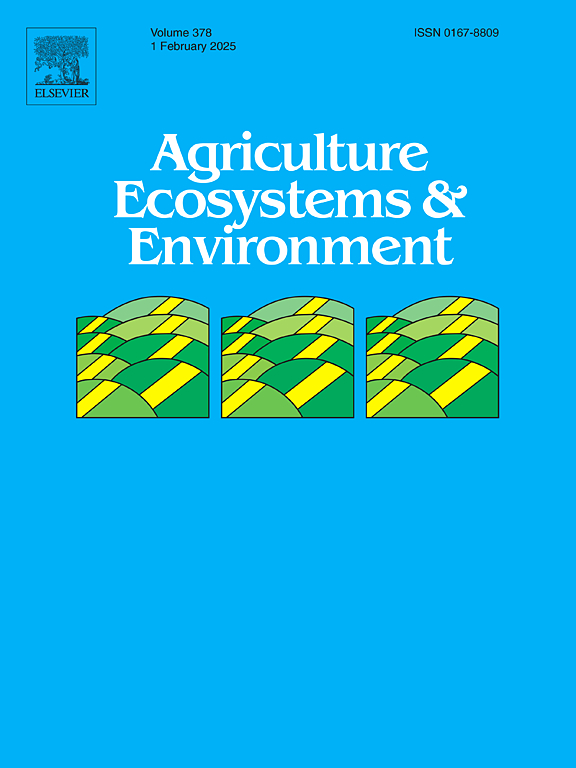水和泥沙调节洗脱及冲积平原种植导致黄河下游氮素增加
IF 6
1区 农林科学
Q1 AGRICULTURE, MULTIDISCIPLINARY
引用次数: 0
摘要
黄河是中国重要的农业生产基地,在陆海传输和氮转化中发挥着关键作用。然而,黄河下游瞬时氮升高的原因尚不清楚。本研究探讨了 2023 年整个水沙调节过程中,黄河下游水体、悬浮颗粒物、表层沉积物以及沿岸冲淤土壤对瞬时氮升高的贡献。结果表明,黄河下游溶解硝酸盐的平均浓度在水和泥沙调节前和调节期间分别是调节后的 1.38 倍和 1.12 倍,原因是水和泥沙调节从滩地洗脱了过多的活性氮。悬浮颗粒物和表层沉积物中的氮释放风险较低(离子交换态氮含量为 0.007-0.033 mg-g-1),但土壤中的氮释放风险较高(离子交换态氮平均含量为 0.092 mg-g-1)。浸出结果表明,悬浮颗粒物或地表沉积物的减少对水中硝酸盐浓度的影响不大。相反,在土壤 S-13(离子交换态氮含量为 0.371 毫克-克-1)中,硝酸盐的浸出率估计平均为 14.74%,离子交换态氮占总氮的 19.25%,其中 76.56%的离子交换态氮被浸出。因此,水和沉积物的调节洗脱以及黄河下游冲淤土壤中氮的持续淋溶显著增加了黄河下游的氮浓度。本文章由计算机程序翻译,如有差异,请以英文原文为准。
Water and sediment regulation eluting and washland planting lead to nitrogen increase in the lower reaches of the Yellow River
The Yellow River is an important agricultural production base in China, plays a key role in terrestrial sea transport and nitrogen transformation. However, the reason for the transient nitrogen increase in the lower Yellow River remains unclear. This study explored the contributions to transient nitrogen elevation from the water column, suspended particulate matter, surface sediments in the lower Yellow River, and washland soils along it throughout the water and sediment regulation event in 2023. Results indicated that the average dissolved nitrate concentrations in the lower Yellow River were 1.38 and 1.12 times higher before and during water and sediment regulation than after, because of excess reactive nitrogen elution from the beach by the water and sediment regulation. The nitrogen release risk was low in suspended particulate matter and surface sediments (ion exchangeable form nitrogen content was 0.007–0.033 mg·g−1) but high in soil (average ion exchangeable form nitrogen content was 0.092 mg·g−1). Leaching results indicated that nitrate concentration in the water was not significantly influenced by the reduction in suspended particulate matter or surface sediments. In contrast, in soil S-13 (ion exchangeable form nitrogen content was 0.371 mg⋅g−1), the estimated leaching rate of nitrate averaged 14.74 %, and ion exchangeable form nitrogen accounted for 19.25 % of total nitrogen, with 76.56 % of ion exchangeable form nitrogen leached. Therefore, the water and sediment regulation elution and the continuous leaching of nitrogen from washland soils around the lower Yellow River notably increased the nitrogen concentration in the lower Yellow River.
求助全文
通过发布文献求助,成功后即可免费获取论文全文。
去求助
来源期刊

Agriculture, Ecosystems & Environment
环境科学-环境科学
CiteScore
11.70
自引率
9.10%
发文量
392
审稿时长
26 days
期刊介绍:
Agriculture, Ecosystems and Environment publishes scientific articles dealing with the interface between agroecosystems and the natural environment, specifically how agriculture influences the environment and how changes in that environment impact agroecosystems. Preference is given to papers from experimental and observational research at the field, system or landscape level, from studies that enhance our understanding of processes using data-based biophysical modelling, and papers that bridge scientific disciplines and integrate knowledge. All papers should be placed in an international or wide comparative context.
 求助内容:
求助内容: 应助结果提醒方式:
应助结果提醒方式:


